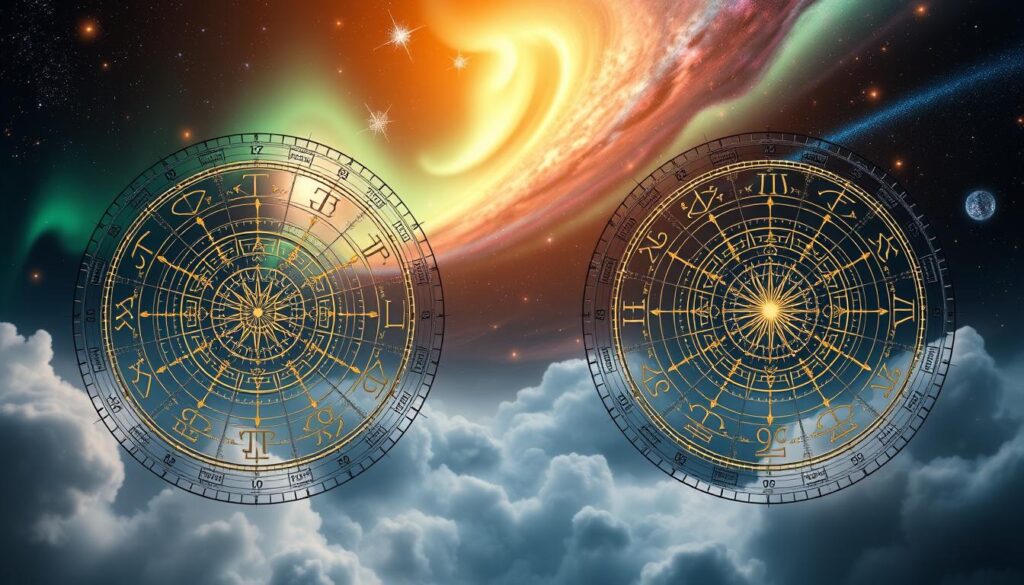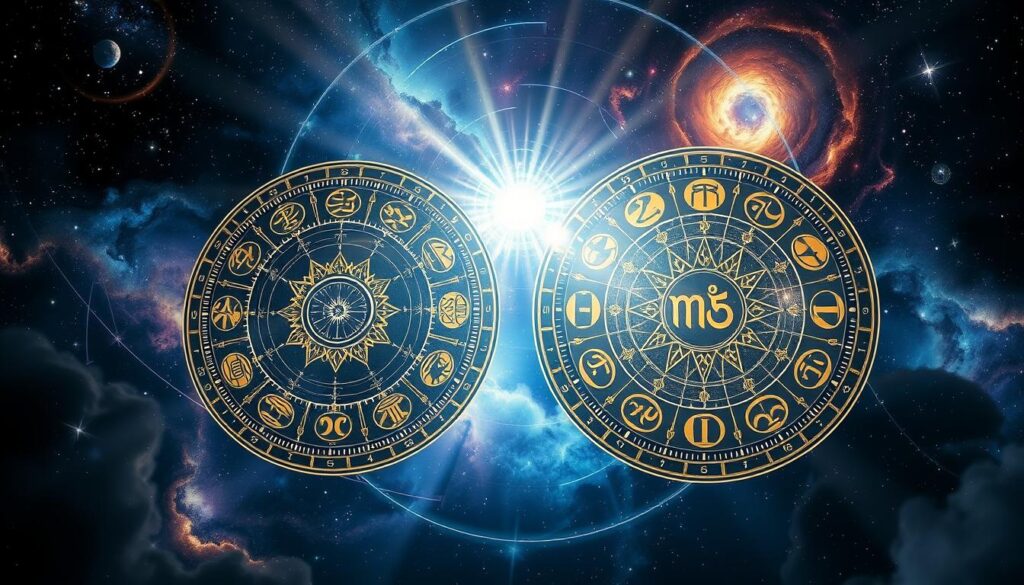Western vs Vedic Astrology: Which Path Guides You Best?

Over 75% of spiritual seekers worldwide explore multiple astrological systems to understand their cosmic blueprint. The journey between western vs vedic astrology represents a profound exploration of celestial alignments and personal transformation.
Spiritual perspectives have long been shaped by these intricate astrological systems, offering unique windows into human potential. Each tradition carries deep wisdom, revealing how celestial movements can illuminate our inner landscape and personal growth pathways.
Whether you’re drawn to the analytical precision of Western astrology or the rich spiritual heritage of Vedic traditions, understanding these powerful systems can unlock transformative insights about your life’s journey.
Key Takeaways
- Discover two powerful astrological approaches with unique spiritual perspectives
- Explore how celestial alignments impact personal understanding
- Learn about the rich cultural roots of different astrological systems
- Understand how cosmic insights can guide personal development
- Recognize the complementary nature of Western and Vedic astrological traditions
Understanding the Roots: Western vs Vedic Astrology
Astrological traditions have woven intricate narratives of human experience across civilizations. These profound systems of ancient wisdom connect us to cosmic understanding, revealing deep insights into human nature and universal patterns.
The world of astrology encompasses rich cultural influences that have shaped our understanding of celestial interpretations. Ancient astrology developed through unique pathways, each reflecting the spiritual and intellectual landscapes of different civilizations.
Origins of Western Astrological Traditions
Western astrology emerged from sophisticated astronomical observations developed in ancient Babylonian and Greek cultures. Key characteristics include:
- Zodiac based on solar movements
- Emphasis on planetary positions
- Psychological interpretation of celestial patterns
Vedic Astrology’s Ancient Sanskrit Heritage
Vedic astrology, rooted in Jyotish practices, represents a profound spiritual approach to cosmic understanding. Its distinctive features include:
- Lunar-based zodiac calculations
- Deep spiritual and karmic interpretations
- Connection to Vedic philosophical systems
Cultural Influences on Both Systems
Modern astrology continues to integrate ancient wisdom with contemporary psychological insights. The evolving nature of these astrological traditions reflects humanity’s enduring quest to understand cosmic connections.
| Aspect | Western Astrology | Vedic Astrology |
|---|---|---|
| Origin | Greco-Babylonian | Sanskrit Vedic Texts |
| Zodiac Base | Solar Positioning | Lunar Calculations |
| Primary Focus | Psychological Interpretation | Spiritual Karma |
Both astrological traditions offer unique perspectives on human experience, inviting practitioners to explore deeper levels of self-understanding through celestial wisdom.
Key Differences in Zodiac Calculations and Planetary Placements

Astrology reveals intricate cosmic mysteries through two distinct approaches: Western and Vedic systems. The zodiac differences between these traditions fundamentally transform how celestial movements are interpreted and understood.
Western astrology relies on the tropical zodiac, which aligns with seasonal changes and the Earth’s position relative to the sun. In contrast, Vedic astrology follows the sidereal zodiac, tracking planetary motions against fixed star positions.
- Tropical Zodiac: Begins at the spring equinox
- Sidereal Zodiac: Anchored to constellation positions
- Horoscope calculations differ by approximately 24 degrees
These planetary placements create significant variations in astrological interpretations. The sidereal system offers a more astronomically precise approach, while the tropical method emphasizes psychological and seasonal influences.
| Characteristic | Western Astrology | Vedic Astrology |
|---|---|---|
| Zodiac Reference | Seasonal Equinox | Fixed Star Positions |
| Planetary Calculation Method | Geocentric Perspective | Astronomical Precise Tracking |
| Interpretation Focus | Psychological Dynamics | Karmic Influences |
Understanding these nuanced celestial movements helps practitioners and enthusiasts gain deeper insights into astrological interpretations, bridging ancient wisdom with contemporary astronomical knowledge.
Birth Chart Analysis: Comparing Western and Vedic Techniques
Astrological charts offer profound insights into personal destiny. Birth chart analysis reveals intricate cosmic blueprints that map an individual’s potential, challenges, and spiritual journey. Western and Vedic astrology approach these planetary influences through unique lens of interpretation.

Diving into birth charts requires understanding two distinct methodological approaches:
- Western astrology focuses on psychological development
- Vedic astrology emphasizes karmic patterns and life events
- Both systems utilize planetary positions for horoscope interpretations
Western Birth Chart Exploration
Western birth chart analysis prioritizes personal growth and emotional landscape. Astrologers examine planetary placements to uncover psychological motivations, relationship dynamics, and potential challenges. The approach centers on individual empowerment through self-understanding.
Vedic Chart Interpretation Insights
Vedic astrological charts delve deeper into destiny’s predetermined pathways. This ancient system interprets celestial configurations as karmic roadmaps, revealing life lessons and spiritual evolution.
Planetary Aspects Decoded
| Planetary Aspect | Western Interpretation | Vedic Meaning |
|---|---|---|
| Saturn | Personal Limitations | Karmic Lessons |
| Jupiter | Personal Growth | Spiritual Expansion |
| Mars | Assertiveness | Energetic Challenges |
“The stars are the land-marks of the universe.” – Sir John Frederick William Herschel
Understanding these nuanced planetary influences transforms birth chart analysis from mere prediction to profound self-discovery. Each astrological chart becomes a personal narrative waiting to be deciphered.
Conclusion
Western and Vedic astrology offer unique lenses for understanding cosmic influences that shape our lives. Each system brings profound insights into personal growth and self-discovery. The beauty lies in recognizing that astrological predictions are not rigid destinies but powerful tools for introspection and personal transformation.
Exploring these diverse astrological philosophies reveals a rich tapestry of wisdom that transcends cultural boundaries. Astrological techniques from both traditions provide deep insights into our inner landscape. Whether you resonate with the precise calculations of Western astrology or the spiritual depth of Vedic practices, the key is finding a system that speaks directly to your soul’s journey.
The true power of astrology emerges when we approach it with an open mind and heart. Astrological remedies and interpretations can guide us through life’s challenges, offering perspective and potential pathways for personal growth. By integrating insights from both Western and Vedic traditions, we unlock a more holistic understanding of our cosmic blueprint.
Your astrological path is a personal voyage of discovery. Embrace the wisdom that resonates most deeply with you, knowing that the universe speaks through multiple languages of understanding. Let these celestial insights illuminate your path, inspire your choices, and empower your personal evolution.








Connect me